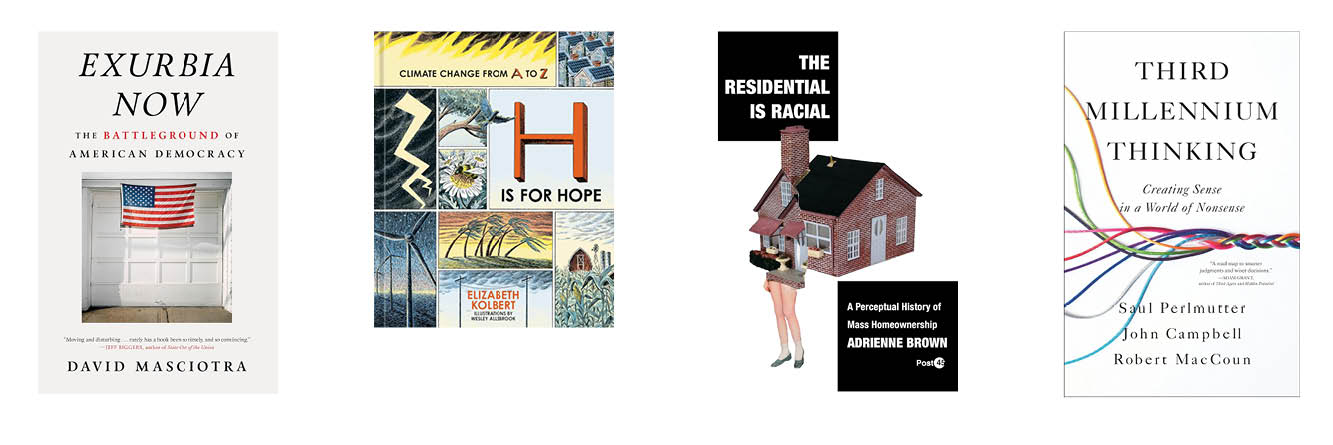March 26, 2024
Finding the right book at the right time can transform your life or your organization. We help you discover your next great read by showcasing four recently released titles each week.
The books are chosen by Porchlight's Managing Director, Sally Haldorson, and the marketing team: Dylan Schleicher, Gabbi Cisneros, and Jasmine Gonzalez. (Book descriptions are provided by the publisher unless otherwise noted.)
This week, our choices are:

Dylan’s pick: Exurbia Now: The Battleground of American Democracy by David Masciotra, Melville House
Beyond a fanatical devotion to former president Donald Trump, one of the curious things that united the rank and file of the January 6 insurrectionist mob was that many of them were residents of one of America’s fastest growing residential areas: Exurbia.
Home to the likes of Georgia’s Marjorie Taylor Greene, Ohio’s Jim Jordan, big box retailers, chain restaurants, monster trucks, and megachurches, exurbia is becoming America’s greatest political battleground, more important to American politics than urban or rural America.
In this brilliant work of political and cultural inquiry, veteran political journalist David Masciotra provides a definitive account of what exurbia is, how it came to be, and how it's transforming American life. Zooming in outside the greater metropolitan area of Chicago—where Masciotra grew up—he shows how exurbia has become a safe space to fly the MAGA flag and romanticize the mores of the pre-civil rights, pre-feminist, pre-gay rights 1950s.
But, as Masciotra also shows, reactionary white flight is not the whole story of small-town America. The story often lost is the power and persistence of small-town liberals—people who believe in equality, celebrate diversity, and enroll in movements for justice. Exurbia, as it turns out, is ground zero for the fight over a democracy mightily beleaguered, yet still full of promise, and still worth fighting for.
Combining interviews, research, and anecdote—and anchored in personal experience—Exurbia Now delivers a powerful ballad on the state of small-town America, and provides a sense of the fight for democracy, on the ground, in the heartland.
Gabbi’s pick: H Is for Hope: Climate Change from A to Z by Elizabeth Kolbert, Ten Speed Press
Climate change resists narrative—and yet some account of what’s happening is needed. Millions of lives are at stake, and upward of a million species. And there are decisions to be made, even though it’s unclear who, exactly, will make them.
In H Is for Hope, Elizabeth Kolbert investigates the landscape of climate change—from “A”, for Svante Arrhenius, who created the world’s first climate model in 1894, to “Z”, for the Colorado River Basin, ground zero for climate change in the United States. Along the way she looks at Greta Thunburg’s “blah blah blah” speech (“B”), learns to fly an all-electric plane (“E”), experiments with the effects of extreme temperatures on the human body (“T”), and struggles with the deep uncertainty of the future of climate change (“U”).
Adapted from essays originally published in The New Yorker and beautifully illustrated by Wesley Allsbrook, H Is for Hope is simultaneously inspiring, alarming, and darkly humorous—a unique examination of our changing world.
Jasmine’s pick: The Residential Is Racial: A Perceptual History of Mass Homeownership by Adrienne Brown, Stanford University Press
Housing experts and activists have long described the foundational role race has played in the creation of mass homeownership. This book insistently tracks the inverse: the role of mass homeownership in changing the definition, perception, and value of race.
In The Residential is Racial, Adrienne Brown reveals how mass homeownership remade the rubrics of race, from the early cases realtors made for homeownership's necessity to white survival through to the 1968 Fair Housing Act. Reading real estate archives and appraisal textbooks alongside literary works by F. Scott Fitzgerald, John Steinbeck, Lorraine Hansberry, Richard Wright, Gwendolyn Brooks, James Baldwin, Ralph Ellison, John Cheever, and Thomas Pynchon, Brown goes beyond merely identifying the discriminatory mechanisms that the real estate industry used to forestall black homeownership. Rather, she reveals that redlining and other forms of racial discrimination are perceptual modes, changing what it meant to sense race and assign it value.
Resituating residential discrimination as a key moment within the history of perception and aesthetics as well as of policy, demography, and democracy, we get an even more expansive picture of both its origins and its impacts. This book discovers that the racial honing of perception on the block—seeing race like a bureaucrat, an appraiser, and a homeowner—has become central to the functioning of the residential itself.
Sally’s pick: Third Millennium Thinking: Creating Sense in a World of Nonsense by Saul Perlmutter, John Campbell, and Robert MacCoun, Little, Brown Spark
In our deluge of information, it’s getting harder and harder to distinguish the revelatory from the contradictory. How do we make health decisions in the face of conflicting medical advice? Does the research cited in that article even show what the authors claim? How can we navigate the next Thanksgiving discussion with our in-laws, who follow completely different experts on the topic of climate change?
In Third Millennium Thinking, a physicist, a psychologist, and a philosopher introduce readers to the tools and frameworks that scientists have developed to keep from fooling themselves, to understand the world, and to make decisions. We can all borrow these trust-building techniques to tackle problems both big and small.
Readers will learn:
- How to achieve a ground-level understanding of the facts of the modern world
- How to chart a course through a profusion of possibilities
- How to work together to take on the challenges we face today
- And much more
Using provocative thought exercises, jargon-free language, and vivid illustrations drawn from history, daily life, and scientists’ insider stories, Third Millennium Thinking offers a novel approach for readers to make sense of the nonsense.



